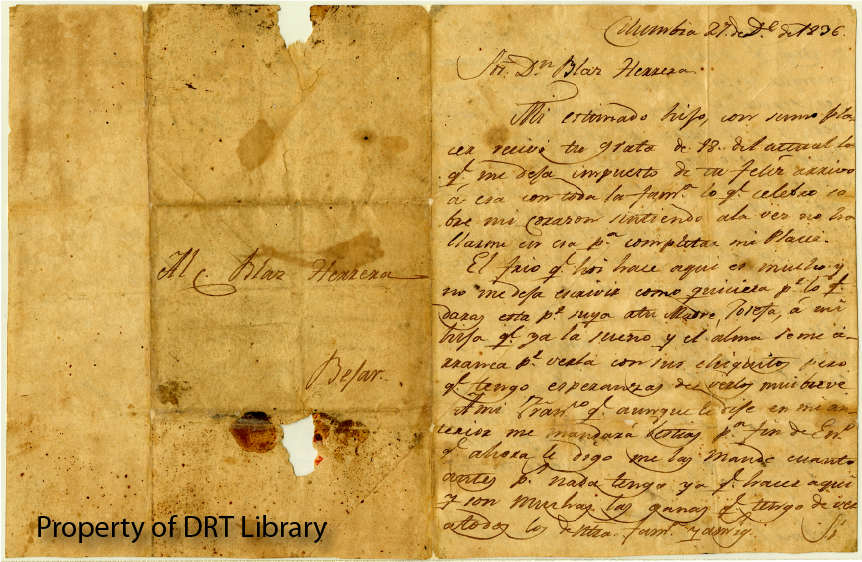Dec. 27, 1837
Letter Warning Against Family Staying in San Antonio
José Francisco Ruiz was born in 1783 in San Antonio de Bexar in the interior province of Spanish Texas. Appointed the first schoolmaster of San Antonio in 1803, he designated as the first school a house acquired by his father, on Military Plaza. In 1805 Ruiz became a city councilman, or regidor, in San Antonio. He served in various official capacities including city attorney, or procurador.
Several years later, he joined the Bexar Provincial Militia as a lieutenant. He took part in the Battle of Medina on August 18, 1813, with the Mexican revolutionary Republican Army of the North at Bexar against the royalist Spanish army in the bloodiest battle ever fought on Texas soil. Following the revolutionaries defeat, Ruiz was exiled, along with many other Mexican insurgents until 1822. He then continued his service in the army, often helping negotiate peace agreements with the native Indians until he cited declining health and was discharged in 1832.
When the Texas independence movement began to gain momentum, Ruiz allied himself with it and traveled to Washington-on-the-Brazos as a delegate to the Convention of 1836 where he and his nephew José Antonio Navarro signed the Texas Declaration of Independence - the only native Texans among the fifty-nine men to sign this historic document.
In the letter pictured below, Ruiz warns his son-in-law, Blas María Herrera, against remaining in town should the Mexicans return to claim San Antonio. Ruiz expressed affection and longing for his family as well as his support for the Republic of Texas. "Under no circumstance," he wrote, "take sides against the Texans . . . for only God will return the territory of Texas to the Mexican government."
Herrera was often referred to as the Paul Revere of the Texas Revolution. In fact, the letter was written during Herrera's scouting missions for the Texas Army. He later brought early word of Santa Anna’s advance on San Antonio. Herrera also escorted and protected José Antonio Navarro and Ruiz to Washington-on-the-Brazos where they signed the Texas Declaration of Independence. Legend states that Gen. Sam Houston used Herrera as a scout and intelligence agent because of his detailed knowledge of the countryside. Following the revolution, Herrera became a farmer and rancher.
